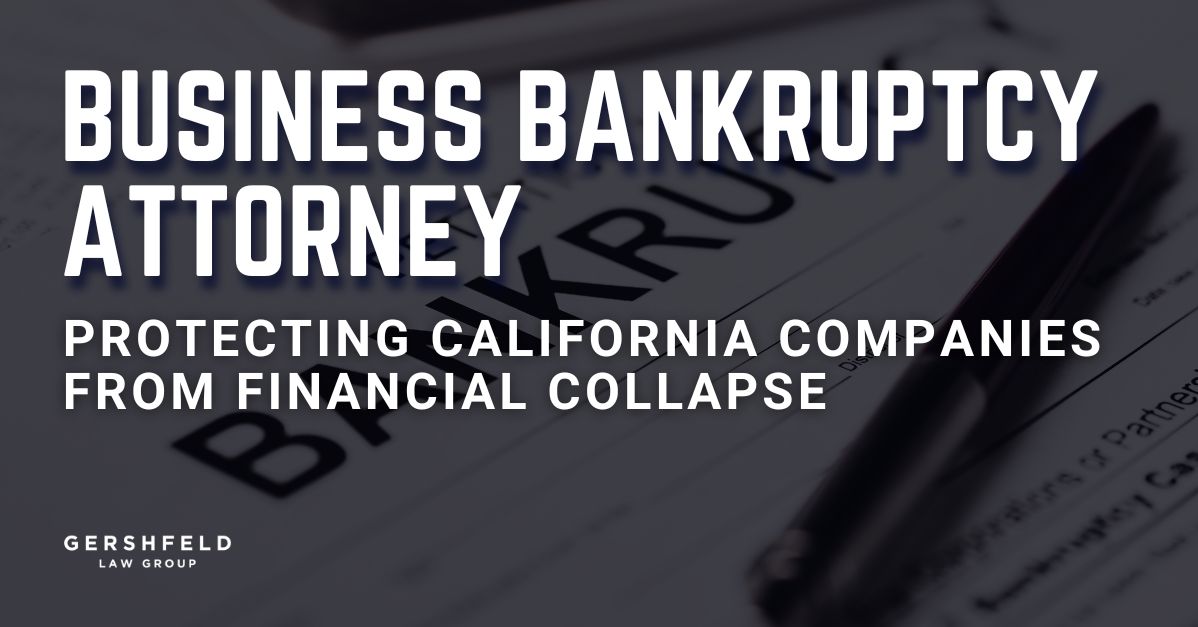Running a business in California is both exciting and challenging. High operating costs, changing regulations, and unpredictable markets can sometimes push companies into financial distress. If you’re worried about overwhelming debt or the possibility of closing your doors, working with a business bankruptcy attorney can provide the guidance and protection you need. With professional legal help, you can explore bankruptcy and restructuring options that protect your company’s future.
Types of Bankruptcy for Businesses
Different businesses face different challenges, which is why bankruptcy options vary:
-
Chapter 7 Bankruptcy: Involves liquidation of assets to pay creditors. Often the last resort for companies that cannot continue operating.
-
Chapter 11 Bankruptcy: Allows businesses to reorganize while continuing operations. Ideal for companies needing time and legal protection to restructure debts.
-
Chapter 13 Bankruptcy: Typically used for sole proprietors or small businesses, offering a repayment plan tailored to future income.
An experienced business debt lawyer will help you determine which option fits your company’s circumstances and long-term goals.
The Role of a Business Bankruptcy Attorney
Filing for bankruptcy is not just paperwork—it’s a legal strategy. A skilled attorney can:
-
Assess your company’s financial position
-
Recommend the right bankruptcy chapter or alternatives
-
Negotiate with creditors to reduce or restructure debt
-
Represent you in court and protect your assets
-
Develop a long-term recovery strategy
Having professional bankruptcy legal help ensures you avoid costly mistakes while safeguarding your company’s reputation and financial health.
Alternatives to Bankruptcy
Bankruptcy is not always the only solution. A business bankruptcy attorney may also recommend alternatives such as:
-
Debt restructuring or negotiation with creditors
-
Business debt settlement agreements
-
Out-of-court workouts to lower obligations
-
Strategic downsizing or asset protection strategies
Exploring alternatives with professional guidance can sometimes help businesses avoid formal bankruptcy while still achieving financial relief.
Long-Term Planning After Bankruptcy
Bankruptcy is not the end of your business—it can be the restart you need. Attorneys help business owners build long-term plans that include credit rebuilding, improved cash flow management, and strategies to avoid future financial pitfalls.
At Gershfeld Law Group, we specialize in guiding California business owners through debt crises. With a clear legal strategy, your company can recover and thrive again.
Frequently Asked Questions
1. What does a business bankruptcy attorney do?
A business bankruptcy attorney evaluates your company’s financial situation, explains available options, files necessary paperwork, negotiates with creditors, and represents you in court. Their goal is to protect your assets and guide your company toward recovery.
2. How do I know if my company needs to file bankruptcy?
If debts are overwhelming, lawsuits are pending, or creditors are threatening collection actions, consulting a business debt lawyer can clarify whether bankruptcy or another solution is the right path.
3. What is the difference between Chapter 7 and Chapter 11 bankruptcy?
Chapter 7 involves liquidating assets and closing the business, while Chapter 11 allows businesses to continue operating under a court-approved repayment plan. Your attorney will recommend the best option for your situation.
4. Can bankruptcy save my business?
Yes. While some cases lead to closure, many businesses survive through Chapter 11 or debt restructuring. Bankruptcy provides legal protection from creditors and allows time to reorganize finances.
5. How much does bankruptcy legal help cost?
Costs vary based on the complexity of your case and the type of bankruptcy filed. Most attorneys provide consultations and transparent fee structures, so you understand expenses before proceeding.









